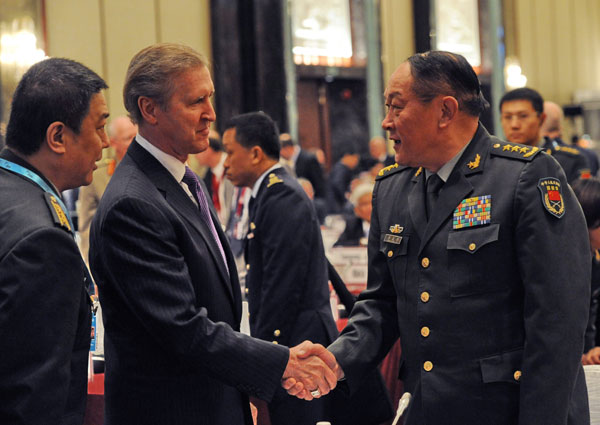China-US
US to keep military presence in Asia: Gates
Updated: 2011-06-05 08:37
By Ma Liyao and Zhou Wa (China Daily)
Neighbors appreciate China's efforts in maintaining regional security
 |
|
Chinese Defense Minister Liang Guanglie (right) shakes hands with former US defense secretary William Cohen at the Asia-Pacific security forum in Singapore on Saturday. [Photo/Agencies] |
Singapore / Beijing - Despite its fiscal troubles, the US will maintain a "robust" military presence across Asia, backed up by new high-tech weaponry, US Defense Secretary Robert Gates said.
Gates made the remark during a speech on the second day of the Shangri-La Dialogue, hosted by the International Institute for Strategic Studies in Singapore.
The US military will expand its presence by sharing facilities with Australia in the Indian Ocean and deploying new littoral combat ships in Singapore, where it has regular access to naval facilities, he said.
"Gates' comments were made as assurance to the allies of the US in the region that its policies will continue after his impending retirement," said Major General Luo Yuan, a senior researcher with the Academy of Military Sciences.
Gates will step down by the end of June, and the current director of the CIA, Leon Panetta, has been nominated to replace him.
Worries about the ability of the US to maintain its military presence have been raised as President Barack Obama faces mounting political pressure to deal with Washington's $1.4 trillion budget deficit and more than $14 trillion in debt.
Gates said that he would take a $100 bet that "in five years, the US influence in this region will be as strong, if not stronger than now".
The US remains as the dominant power in the Asia-Pacific region, and its influence over the region will continue in the next five years, said Yuan Peng, director of the American Studies Center at China Institutes of Contemporary International Relations in Beijing.
In his speech, Gates also said the key to solving the maritime issues in the Southeast Asia is to provide a "peaceful mechanism" that will not intensify tensions.
"We should not lose any time before strengthening these mechanisms of dealing with the claims. Clashes serve nobody's interests," he said in answer to questions about the South China Sea issues.
China's stance on these issues remains that they should be solved bilaterally, between China and other coastal countries.
Confidence is needed that the parties concerned can solve the problems themselves through a peaceful bilateral mechanism.
The regional disputes should be solved by countries in this region, Luo said, adding that a third party, who is not familiar with the history and culture in the region and has a different mode of thinking, can make things more complicated .
During meetings with Chinese Defense Minister Liang Guanglie on the sidelines of the Shangri-La Dialogue, China's neighbors voiced appreciation on Saturday for Beijing's efforts toward regional security and international assistance.
Kim Kwan-jin, defense minister of the Republic of Korea, appreciated China's work at maintaining stability and peace on the Korean Peninsula and thanked China for its help in protecting South Korean merchant ships in waters off Somalia from pirate attacks in February.
Japanese Defense Minister Toshimi Kitazawa and Wayne Mapp, defense minister of New Zealand, thanked China for its rapid aid to their countries when they were struck by major earthquakes this year.
Liang also met with Russian Deputy Prime Minister Sergei Ivanov, who is in charge of the country's national defense affairs and military industries.
Gates called for all countries to recognize the potential problems caused by cyber attacks, saying that the US defense system is under attack "all the time".
The Pentagon is working to identify hackers, who will be responded to in kind or with traditional offensive action, Gates said. "We take the cyber threat very seriously and we see it from a variety of sources, not just one or another country," he said.
"China is one of the biggest targets of cyber attacks," said Luo, adding that China always tries to work with other countries to fight against such attacks.
AFP contributed to this story.
Specials

Birthday a new 'starting point'
China's national English language newspaper aims for a top-notch international all-media group.

Room at the inn
The Chinese hotel industry experiences a building boom, prompting fears of oversupply.

Pearls of wisdom
Chinese pearl farmers dominate the world market but now want to work smarter, not harder